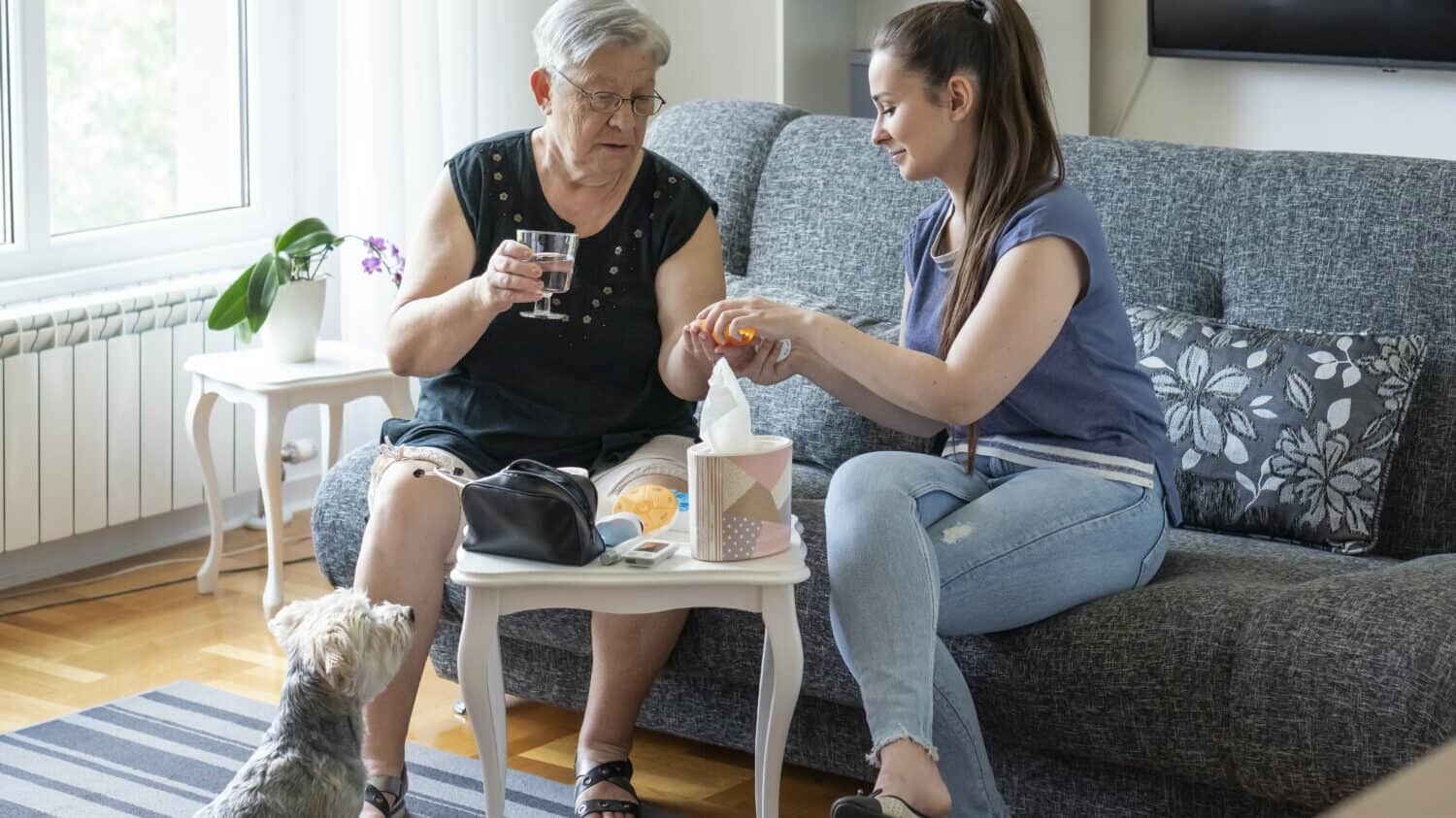
Guide to Pet-Friendly Assisted Living Facilities
Moving into an Assisted Living Facility but stuck with the fear if your pet is also allowed? Don’t fret, we’re here to give you all of the answers in addition to the benefits of keeping your pet companion right by your side through it all. Whether you are already a pet owner or looking in the market to become a pet owner, know that it’s possible to have a pet companion as a senior transitioning into an Assisted Living Facility.
As you make the decision to transition into an Assisted Living Facility or look for a new place, having a pet with you, unfortunately, narrows down your options a tad bit, but it may just be worth the trouble. We help you navigate all of the ins and outs of how to find pet-friendly Assisted Living Facilities and we also provide you with an educational toolkit regarding the benefits of being a pet-owning senior.
Are Pets Allowed in Assisted Living Facilities?
You may have heard mixed responses when inquiring about pet-friendly Assisted Living Facilities, but let’s get straight to the point – they are welcomed, but each facility has its own policies. Luckily, we guide you through the basic details that should resolve the majority of your concerns. Let’s look at some rapid-fire frequently asked questions!
- Pet Friendly Assisted Living Facility 101
- Pet friendly Assisted Living Facilities are slowly on the rise as the benefits of seniors owning a pet far outweigh the cons.
- Seniors that own pets tend to be less lonely, have better health, and are more active. More on this down below with research demonstrating huge benefits!
- Assisted Living Facilities are now offering pet amenities, conveniently located near dog parks and pet grooming services
- Which pets are allowed in Assisted Living Facilities?
- Each Assisted Living Facility has their own pet policy, meaning you may get different responses from place to place.
- Pet policies are usually not spelled out specifically on their website, but you can expect things like “We welcome your furry friends at ___.”
- It’s expected that each facility will have a non-refundable pet fee ranging from $200-300 along with a monthly pet-rent fee at ~$20-30 per month. A limit of two pets tends to also be the standard for most Assisted Living Facilities.
- There will be an initial pet screening process when meeting with staff, with guidelines of pets being under 20 pounds. Exceptions can be made based on meeting the animal and their owners. Staff’s decisions are primarily swayed by the animal’s behavior, health of the owner/resident, and ability of owner/resident’s ability to care for the pet safely.
- Will other pets be around?
- If the Assisted Living Facility is pet friendly, expect that there will be residents that also own pets. As with most things, it’s up to residents if they choose to have their pets interact with one another.
- Residents that have pet allergies may stay at a different wing of the Assisted Living Facility. As a sign of respect for all residents, some facilities have designated areas where pets are not allowed.
- Are there tips to care for pets in Assisted Living Facilities?
- Bring your pet’s favorite blankets, toys, or furniture to ease them into the apartment.
- Make sure to have designated areas where your pet is able to hang out as the apartment unity may be smaller than their original homes.
- Pick and designate safe places for their feeding bowls and litter boxes.
- Make sure to keep things tidy and clutter free as you also want to decrease your fall risk.
- Most Assisted Living Facilities have pet designated areas to take them walking or on bathroom breaks.
- Be respectful that not all residents share the same feelings that you do with pets.
- Where do I find pet friendly Assisted Living Facilities?
- Visit petfriendlyseniorliving.com
- In the large search bar, enter the name of your city or by zip code to find all of the pet friendly Assisted Living Facilities near you.
- A long list of facilities will populate afterwards. A short blurb is provided under each facility name along with their contact information. If you would like to view pricing and availability of a specific facility, either call the number provided or sign up with your name, email, and phone number.
Benefits of Owning a Pet among Seniors
More and more Assisted Living Facilities are now transitioning into being a pet-friendly facility and some even go so far as to encourage some seniors to have pets. This hasn’t always been the case though, as many transitional facilities failed to recognize the benefits that could be gained from pet ownership among seniors.
In the United States, experts studying the relationship between seniors and pets found that close to 25 percent of seniors live in the company of a pet. Among seniors that own a pet, especially for those that live alone, senior pet owners spend upwards of 80 percent of the day bonding with their pet. As people are made aware of the outstanding mental and physical health benefits that are gained from pet ownership among seniors, Assisted Living Facilities are now in fact slowly encouraging pet ownership among their residents.
Research experts have found the main benefits among seniors and pet ownership to include:
- Finding purpose, value, and structure in their lives.
- Improved feelings of comfort and safety.
- Social inclusion and participation in the community.
How exactly do the benefits occur? A formal term known as “Human-Animal Bond” was coined by a team of researchers that has been described as
- A closed and specialized bond between a pet and its owner that may promote positive mental health in seniors.
- Multiple studies have shown the role of pet ownership among seniors that there is a strong positive relationship between owning a pet and the overall well-being of the pet owner. For seniors that own a pet to intentionally assist in their own emotional and self-care needs, positive benefits of well-being are even greater.
- Among seniors that have limited social outlets, pet ownership was reported as one of their most valued and important relationships among seniors to help reduce feelings of emotional loneliness.
Purpose, Value, and Structure
The world can seem like a bleak or confusing place when a person is trying to find a new purpose in life. With many new life transitions that seniors experience, finding a new purpose in life can seem discouraging. We lose the motivation to carry on with the day. Our routines become mundane. The activities we used to enjoy become scarce and lose their value.
Researchers conducted interviews among community-dwelling seniors that own a pet and found that many of the participants found new purpose in life, developed new routines, and valued their relationship with their pets. New routines expressed by the participants included:
- A woman named Jasmine expressed that having a pet gave them ‘a bit of structure’ she enjoyed attending to day to day.
- A man named Michael stressed that his responsibilities of routines for ‘taking his pet for a walk, letting him out, letting him back in, filling the water, feeding them, and cleaning up after them’ gave him new value that he would not be able to find without a pet.
Pets also served as a strong source of motivation to actively have seniors attend to participating in activities rather than being homebound. Many seniors described their experiences as pet owners to:
- Play an important role in enabling them to have something productive to look forward to, giving them a sense of purpose, value, and ultimately improve their overall self-esteem and mental health.
- A woman named Nancy mentioned her pet was the reason she had the motivation to ‘get up and do things every day’.
- A woman named Iris shared an emotional experience with how her pet ownership restored life, meaning, and purpose back into her life by creating a routine for her, ‘My whole life, more or less, I have always been looking after people. Family, children, and then my partner. And that was all gone, so I was feeling pretty useless. So, she (pet) gave me a sense of purpose.’
If you find yourself in the same boat as these shared experiences, keeping your pet or becoming a new pet owner can assist in feelings of loneliness, loss of motivation, and becoming more active. Of course, it’s not an absolute solution but what you put into the relationship can spit out what you can gain from the relationship as a pet owner. Through the physical things you have to do and the stimulating brain work that is required in order to care for a pet, the overpowering mental health benefits remain positive among seniors that own a pet.
Comfort and Safety
In the same group of pet-owning seniors that participated in the research study, comfort and safety were a repeated theme. Many of the participants shared:
- Pets were a cure for seniors when it came to uplifting their moods, providing companionship and a sense of security.
- Pets were ‘constant’, in the sense that pets were reliable companions to rely on such that pets had the ability to show their ‘care for you just as much as you care for them’.
- A woman named Vivian expressed that the pet provided ‘unconditional love’.
- A woman named Iris shared how her pet helped with her diagnosis of depression, sharing that after getting her pet, she was ‘very much improved’ and ‘a lot happier’ due to the bonding that was allowed as a pet owner.
- A man named Ben shared how his pet of 11 years was able to help him through his grieving process of his late wife, ‘When my wife died, she was consoling to me, without talking to each other…The recovery was a lot shorter because of the dog.’
Finding comfort in another person takes time, effort, and several years. For seniors that have limited social outlets, this can be particularly challenging. Pets function as an immediate source of comfort through being a reliable source of a companion, reciprocating emotional support, along with just being present. Oftentimes, as shared by Ben, pets are able to provide alleviation in the process of grieving simply by being present – no words or conversations are required.
In very rare circumstances, pets have also been able to pick up on health issues experienced by their owners. As shared by a participant named Isabel, her pet had the ability to determine when she wasn’t feeling well:
- ‘I have had epilepsy ever since I was a teenager…Cleo (pet) told me in her own way that I will have a seizure before I had one…She would use that type of bark, and I knew I had to go and lie down.’
Although a rare instance, pets have the ability to assist with their owner’s sense of security along with filling in the emptiness of the home by happily greeting many of their owners when they came home as shared by many of the participants:
- ‘A house is not a home without someone in it…when you walk through that door, and someone is so happy to see you, it brings you up.’
Social Inclusion and Participation
Pets can at times function as a bridge to making new friends and rekindle family and old friend relationships. At the end of the day, it’s difficult to maintain a relationship with someone when there is no community or sense of purpose to return to a particular environment. As adults and seniors, our relationships stem mainly from the activities we do daily, our jobs, and our hobbies. Many seniors transitioned out of jobs and decreased their participation in hobbies as it became more difficult to go from place to place with new physical limitations.
Pet ownership continued to prove as a remarkable antidote to decreased social participation among seniors. In the same research study, senior participants described their pets as a ‘connector’ between themselves and others. Shared experiences of seniors and their ability to improve their social outlets included:
- A man named Ben described his experience with maintaining and creating new friendships due to his pet, ‘The social connection takes 20 minutes, and it just matures, and everybody stays friendly together.’
- A man named Morris shared his ability to rekindle old friendships he knew from 40 years ago through his pet related activities, ‘They were virtually all strangers. But now I know the names of half of them, and the names of most of their dogs…the dogs meet first, then you get to know the people.’
- A woman named Vivian shared how her pet led her to become involved in a virtual community on social media and assisted in her new development of companions despite living alone, ‘She’s (pet) got her own Instagram page… I am always posting on Facebook because we belong to the “Groodle and Oodle” pages… And we also have dog meet-ups and they are all through Facebook.’
- One participant named Michael shared how his pet led him to develop a lifelong friend that began inviting him to celebratory events such as breakfasts, birthdays, and even a wedding.
As adults, we understand the difficulty of maintaining meaningful friendships. Some are fleeting, some never develop, and some are just polite gestures that are not likely to spark into anything substantial. Through a routine and a constant interaction through some agents in a community are opportunities for meaningful friendships to thrive. Pets seem to be this ‘agent’ for seniors. Increased socializations greatly improve the overall well-being shared among pet-owning seniors through pet-related interactions.
Challenges of Owning a Pet as a Senior
It would be remiss to say that there are only positive outcomes that come with pet ownership for seniors. Although there are challenges that come with pet ownership, it’s important to preface that seniors who are capable of having a pet experience benefits that far outweigh the negatives. What constitutes whether a senior should get a pet or not?
- If a senior’s health is quite ill and they tend to ignore their health in order to care for a pet, it would be more prudent to avoid having a pet.
- Seniors that experience scarce financial resources should also avoid pets. As a pet owner, seniors must consider their own ability to provide for their own needs along with a pet’s needs. It has been reported in research studies among staff members working in Assisted Living Facilities that residents forgo their own needs and spend it on their pets instead, diminishing their own health.
- Seniors sometimes risk or delay their ability to transition into Assisted Living Facilities if they are not allowed to remain with their pets.
- Some seniors experience extreme distress when losing their beloved pet. If a senior has a history of poor coping strategies, it is not recommended to have a pet as the distress can become severe and ultimately impede their mental health.
Best Cat and Dog Breeds for Seniors
In the market or still window shopping for a pet? Before you make that final decision, know what you’re getting yourself into before pulling the trigger. See below for a list of cat and dog breeds that have been endorsed by veterinarians to be most compatible with seniors.
Cats
- Birman: An affectionate, gentle, and intelligent cat. They are playful but not overly playful. Known for their ability to form close bonds. Hair length is semi-long, have moderate activity levels, and easily groomed.
- Ragdoll: A loving and calm cat that is known for their affection and laid back personality. They love following their owners around and helping with things you may be doing. Coat is long haired, moderate activity levels, and easily groomed.
- British Shorthair: Taken the nickname as the ‘teddy bear’ of the cat family as they are good natured, playful as kittens but mellow as adults. They are independent creatures and spend their time amusing themselves. Coat is short haired, low activity levels, and short hairs make it easy to groom.
Dogs
- Poodle: Known to be easy to train, eager to please their owners, and does not require a ton of exercise. They are content lounging in the home and are ideal for seniors due to their gentle and nurturing personalities. Grooming is a bit heavy (every four to six weeks) but do not shed.
- Cocker Spaniel: Rated as one of the best companions for seniors. Their weight ranges from 20 to 30 pounds and have no pent-up energy to dispel. Regular walks are necessary. They are easy to train, have long coats, and enjoy playing in open spaces.
- French Bulldog: One of the best breeds for seniors that live in an apartment. They don’t have high energies, have good spirits, and are goofy personalities. Known for their cuddles, makes for a great pair for seniors that want tons of affection from their pets.






